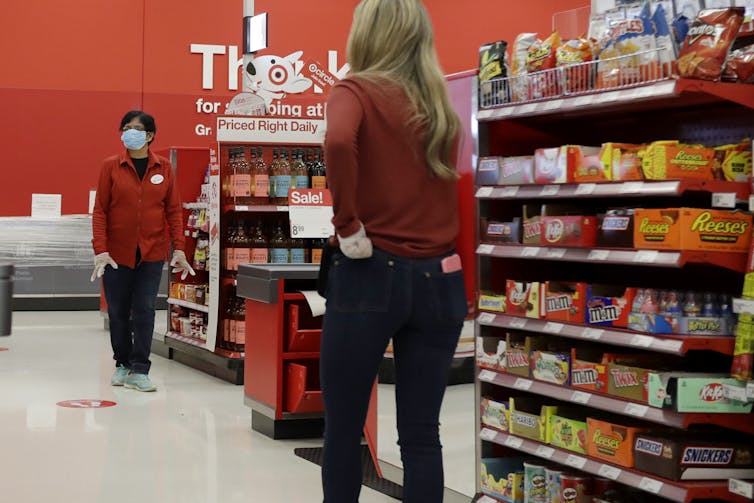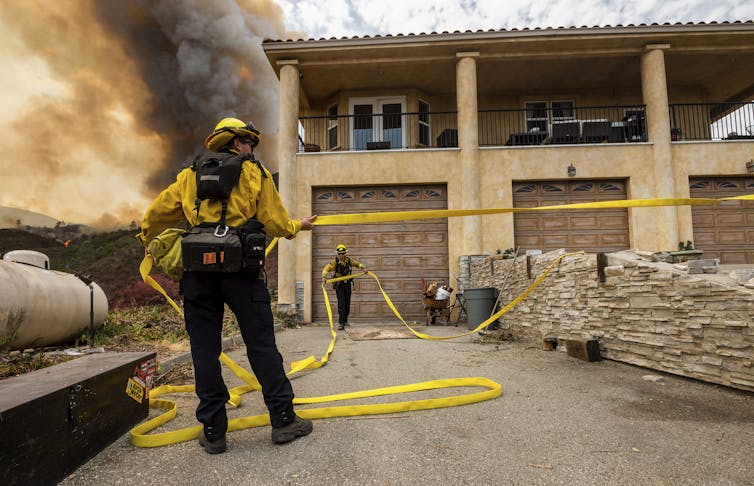Challenge trials for a coronavirus vaccine are unethical – except for in one unlikely scenario
- Written by Ben Bramble, Visiting Fellow, Princeton University
The world urgently needs a vaccine for COVID-19. Only when a vaccine is approved and people are safe can countries fully end their lockdowns and resume normal life. The trouble is that such vaccines usually take years[1] to develop and test for efficacy and safety.
Recently, some bioethicists have proposed a way of speeding up[2] this testing process by several months. Researchers would put volunteers in quarantine with access to the best medical care, give these volunteers one of the trial vaccines and then directly expose them to the coronavirus. This type of intentional exposure is called a challenge trial[3], and since researchers would not have to wait for subjects to encounter the virus in the normal course of their daily lives, it could result in a vaccine much faster than a normal trial. Researchers need to know if the vaccine they are testing actually produces some sort of immunity, so people have to come in contact with the coronavirus. The question is whether to produce that contact intentionally, or let random chance do it.
I am a philosopher and bioethicist who has been researching and writing a book on the ethics of the pandemic[4]. Challenge trials are not a new idea[5], and have always faced a major ethical question: Do they exploit test subjects even if the subjects volunteer?
To answer that question, ethicists must consider an equation involving risk, knowledge and need. Given the current state of the pandemic, there is only one rare situation in which I believe a challenge trial would be ethical. In most cases, it would unfairly exploit those who volunteer.
 Essential workers face some of the highest risks of contracting the coronavirus so a challenge trial wouldn’t be that much riskier.
AP Photo/Nam Y. Huh[6]
Essential workers face some of the highest risks of contracting the coronavirus so a challenge trial wouldn’t be that much riskier.
AP Photo/Nam Y. Huh[6]
Risk minimization
The first question is risk. Some proponents of challenge trials say that they might be ethical if you only select volunteers who already have a high risk of catching the virus[7] – for example, people who live in high transmission areas, or who are essential workers like doctors, nurses, bus drivers, cleaners, food workers and so on[8]. People who support this argue that since these people are already at great risk, being purposefully exposed to the virus isn’t that much riskier[9] for them than normal life.
But I see a big problem with this idea. These people are at such high risk of catching COVID-19 in large part due to failures of governments to properly lock down, test and contact-trace[10]. In asking these people to volunteer, I see governments as saying to them: “Due to our repeated blunders, you’re still at a very high risk of something really, really terrible. Sorry about that. But now, seeing as you are already so very imperiled, would you mind terribly if we increased your risk even further, to help us all get out of this giant pickle?” I believe that there is something deeply wrong with asking people this.
Full information
OK, risk is bad, but what if volunteers fully understand the risks they face? Would that make challenge trials ethical?
Unfortunately, it is unclear whether this is possible. The medical community’s knowledge of the full health impacts of COVID-19 is simply too incomplete right now[11]. For example, recent studies suggest the virus might cause long-term heart damage[12] in patients who do not even require hospitalization during their initial infection.
Moreover, in order to reduce the risks of volunteers becoming severely ill or dying, they would likely have to be young and healthy people[13]. But such people have, by definition, never experienced severe illness before. Even if they have a good theoretical grasp of the health risks, that is a far cry from firsthand experience of severe, long-term illness. This is a substantial problem.
 Firefighters face risks but are essential because there is no other way to do that job.
AP Photo/Noah Berger[14]
Firefighters face risks but are essential because there is no other way to do that job.
AP Photo/Noah Berger[14]
Analogies with other professions
The final point that people make is that there are many other contexts in which it is ethical to allow people to take on big health risks for the sake of the community – firefighters, police officers, soldiers and many other people who work dangerous jobs do this daily. And of course, millions of essential workers are still going to work in the morning despite the risks involved.
The difference between firefighting and a challenge trial has to do with need. While there is robust debate going on over just how essential many of these jobs are[15], if every essential worker stopped going to work, society would grind to a halt. The country needs grocery store workers and firefighters to do their jobs.
By contrast, if the U.S. prevents people from volunteering for challenge trials, society will not collapse. It is true that the country needs a vaccine, but challenge trials are not the only way to get one. Researchers can simply run vaccine trials in the normal way.
When challenge trials are ethical
If a normal vaccine trial can be run, I don’t believe challenge trials can be justified.
But imagine some point in the future before a vaccine is approved. Efforts to contain the virus have proven so effective that there is no longer enough of the virus still circulating in communities for a normal vaccine testing process to produce a result, but there is enough virus around to pose a significant risk of outbreaks if lockdowns were relaxed. In this specific scenario, countries could face a choice between staying in various states of lockdown indefinitely or conducting human challenge trials.
[Deep knowledge, daily. Sign up for The Conversation’s newsletter[16].]
Here, it would be not only morally permissible, but arguably morally required to let people volunteer for challenge trials. The alternative to doing so would be a permanent and substantial diminishment of society and quality of life. Trial volunteers would then become truly analogous to essential workers, needed to prevent a kind of societal collapse.
If countries immediately commit to the effective interventions – mask wearing[17], locking down[18], testing[19] and contact-tracing[20] – and then actually do them, the virus could be contained. In that case, challenge trials could be justified.
Whether a country ends up facing the decision between indefinite lockdowns and a challenge trial remains to be seen, as there are a lot of unknowns with this virus. Until that decision is upon us, the equation involving risk, knowledge and need does not add up to a sufficient justification for challenge trials.
References
- ^ usually take years (www.theguardian.com)
- ^ proposed a way of speeding up (doi.org)
- ^ challenge trial (doi.org)
- ^ ethics of the pandemic (www.benbramble.com)
- ^ not a new idea (apps.who.int)
- ^ AP Photo/Nam Y. Huh (www.apimages.com)
- ^ who already have a high risk of catching the virus (onlinelibrary.wiley.com)
- ^ essential workers like doctors, nurses, bus drivers, cleaners, food workers and so on (www.weforum.org)
- ^ isn’t that much riskier (doi.org)
- ^ failures of governments to properly lock down, test and contact-trace (theconversation.com)
- ^ simply too incomplete right now (www.npr.org)
- ^ might cause long-term heart damage (www.statnews.com)
- ^ young and healthy people (theconversation.com)
- ^ AP Photo/Noah Berger (www.apimages.com)
- ^ just how essential many of these jobs are (www.nytimes.com)
- ^ Sign up for The Conversation’s newsletter (theconversation.com)
- ^ mask wearing (theconversation.com)
- ^ locking down (theconversation.com)
- ^ testing (theconversation.com)
- ^ contact-tracing (theconversation.com)
Authors: Ben Bramble, Visiting Fellow, Princeton University

